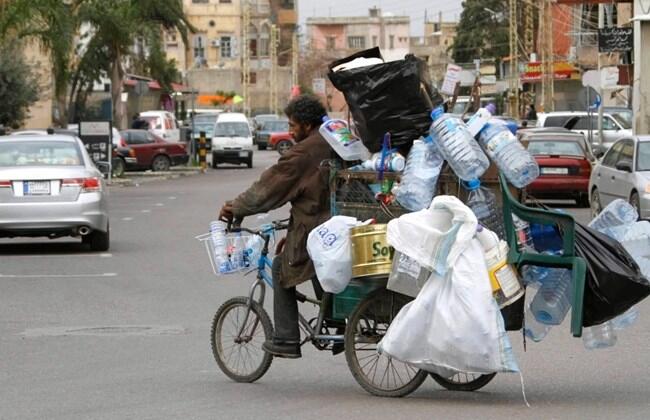Every day, hundreds if not thousands of people dig through the country’s unsorted trash and pick out the plastics, glass, aluminum, paper and so forth. Some of these people work for Sukleen, the waste management contractor for Beirut and Mount Lebanon, while others work on their own. Through a chain of sales, the booty eventually reaches a recycler, who restores the material to a more primitive form. It is sold to manufacturers and reused. The recycling market is opaque, exists in the private sector, and is largely unregulated. “There is a business going. Our waste has some very valuable products in it, which prompts people to get it and buy it,” said Jad Chaaban, an economics professor at the American University of Beirut. Recycling plants will pay a scavenger or dealer around $200 per ton of tin, $60 per ton of glass, $50 per ton of paper, and anywhere from $100 to $300 per ton of plastics. Prices vary, depending on how the recyclables are delivered – whether they are clean, pure or packaged in certain ways. That those prices are listed per ton indicate that the market prefers large operators. “In this sector, economies of scale are key,” Chaaban said. One of the largest operators is Sukleen. At their plant at Karantina, machines and people dig through the trash and pick out the reusable material. “They get your trash like it is. They have a sorting facility. They sell from your trash, and they charge the government $170 per ton [to collect it from the street], and they make $70 on each ton on top of that,” Chaaban said. Sukleen would not comment on its finances, but if Chaaban’s figures are true, they would suggest the company’s contract is quite lucrative, netting it up to $240 per ton. “These companies should be scrutinized and properly regulated so they don’t charge the Lebanese public an excessive price for their service and end up profiting without paying back the municipality any amount on the sale of recycling,” Chaaban said. Yet, despite the wealth to be found in recycling, Lebanon still buries much of its treasure. “We know the statistics. Compared to Europe, we still have a lot of waste going to dump sites,” Chaaban said. Just 8 percent of Lebanon’s municipal waste is recycled, according to a 2014 report, though over 36 percent is recyclable material. The Daily Star











